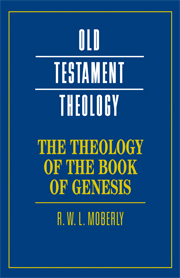Book contents
- Frontmatter
- Contents
- General Editors' Preface
- Preface
- List of Abbreviations
- 1 WHAT IS A “THEOLOGY OF GENESIS”?
- 2 ON READING GENESIS 1–11
- 3 GENESIS 1: PICTURING THE WORLD
- 4 GENESIS 2–3: ADAM AND EVE AND “THE FALL”
- 5 GENESIS 4: CAIN AND ABEL
- 6 GENESIS 6–9: CATACLYSM AND GRACE
- 7 ON READING GENESIS 12–50
- 8 GENESIS 12:1–3: A KEY TO INTERPRETING THE OLD TESTAMENT?
- 9 GENESIS 12:3A: A BIBLICAL BASIS FOR CHRISTIAN ZIONISM?
- 10 GENESIS 22: ABRAHAM – MODEL OR MONSTER?
- 11 ABRAHAM AND THE “ABRAHAMIC FAITHS”
- 12 GENESIS 37–50: IS JOSEPH WISE?
- Further Reading
- Author Index
- Scripture Index
- Subject Index
5 - GENESIS 4: CAIN AND ABEL
Published online by Cambridge University Press: 05 June 2012
- Frontmatter
- Contents
- General Editors' Preface
- Preface
- List of Abbreviations
- 1 WHAT IS A “THEOLOGY OF GENESIS”?
- 2 ON READING GENESIS 1–11
- 3 GENESIS 1: PICTURING THE WORLD
- 4 GENESIS 2–3: ADAM AND EVE AND “THE FALL”
- 5 GENESIS 4: CAIN AND ABEL
- 6 GENESIS 6–9: CATACLYSM AND GRACE
- 7 ON READING GENESIS 12–50
- 8 GENESIS 12:1–3: A KEY TO INTERPRETING THE OLD TESTAMENT?
- 9 GENESIS 12:3A: A BIBLICAL BASIS FOR CHRISTIAN ZIONISM?
- 10 GENESIS 22: ABRAHAM – MODEL OR MONSTER?
- 11 ABRAHAM AND THE “ABRAHAMIC FAITHS”
- 12 GENESIS 37–50: IS JOSEPH WISE?
- Further Reading
- Author Index
- Scripture Index
- Subject Index
Summary
The famous story of Cain and Abel is puzzling for most readers. Why does God prefer Abel's sacrifice to Cain's? And what is the story really about? As with all the resonant narratives of Genesis, there are various possible readings, whose theological significance may differ considerably.
Onetime-honored approach is to see the Cain and Abel narrative as a negative exemplification of the double love commandment, a failure to love God and love neighbor. This reading takes its cue from the context of the story, subsequent to Genesis 3 (traditionally construed): “Gen 4 graphically illustrates how alienation from God produces alienation from one's fellow human beings.” Alternatively, one can read the story as exemplifying some of the problems of human free will: “The use that humans make of their freedom to be responsible for themselves is catastrophic: the first deed recounted is a murder, fratricide in fact…. We see here what humans are capable of. But we also see, with inescapable clarity, that God will not allow this: Cain is banished from the human community.” Or one can read the story as an overture that introduces certain prime moral and theological categories that will be more fully developed elsewhere in the Bible: “Genesis 4 is not only the first narrative about sin and guilt that compresses the action into particular terms, it is also at the same time a narrative of forgiveness that unfolds at least in rudimentary ways.”
- Type
- Chapter
- Information
- The Theology of the Book of Genesis , pp. 88 - 101Publisher: Cambridge University PressPrint publication year: 2009



